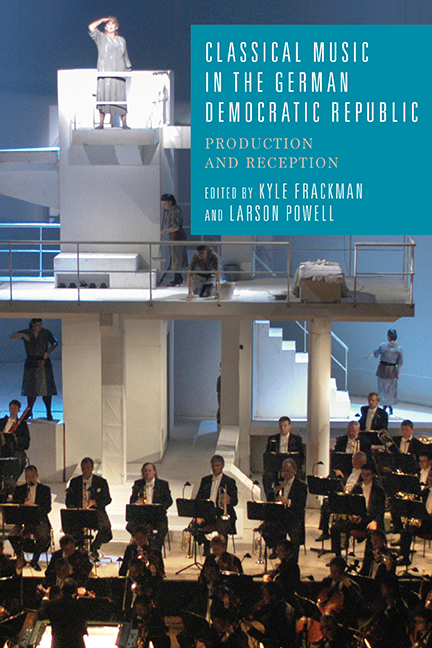Book contents
- Frontmatter
- Contents
- Acknowledgments
- List of Abbreviations
- Introduction: Music and Heritage in the German Democratic Republic
- 1 Provincialism, Modernity, and the Classical Heritage: The Administrative Structure of the GDR and the Situation of Music Production
- 2 Classicism as Anti-Fascist Heritage: Realism and Myth in Ernst Hermann Meyer’s Mansfelder Oratorium (1950)
- 3 Positioning Georg Knepler in the Musicological Discourse of the GDR
- 4 Ehrt euren Deutschen Meister: Reproducing Wagner in the GDR
- 5 The Embodiment of Collective Memory in Neue Odyssee
- 6 Marxism and Feminism in Ruth Berghaus’s Staging of Don Giovanni
- 7 Beyond the Gewandhaus: Mahler and the GDR
- 8 Hanns Eisler’s Funeral and Cultures of Commemoration in the GDR
- 9 Exile—Remigration—Socialist Realism: The Role of Classical Music in the Works of Paul Dessau
- 10 “What a Satisfying Task for a Composer!”: Paul Dessau’s Music for The German Story (. . .Du und mancher Kamerad)
- 11 Friedrich Schenker and the Third Way
- 12 A Prism of East German Music: Lothar Voigtländer
- Notes on the Contributors
- Index
1 - Provincialism, Modernity, and the Classical Heritage: The Administrative Structure of the GDR and the Situation of Music Production
Published online by Cambridge University Press: 21 May 2021
- Frontmatter
- Contents
- Acknowledgments
- List of Abbreviations
- Introduction: Music and Heritage in the German Democratic Republic
- 1 Provincialism, Modernity, and the Classical Heritage: The Administrative Structure of the GDR and the Situation of Music Production
- 2 Classicism as Anti-Fascist Heritage: Realism and Myth in Ernst Hermann Meyer’s Mansfelder Oratorium (1950)
- 3 Positioning Georg Knepler in the Musicological Discourse of the GDR
- 4 Ehrt euren Deutschen Meister: Reproducing Wagner in the GDR
- 5 The Embodiment of Collective Memory in Neue Odyssee
- 6 Marxism and Feminism in Ruth Berghaus’s Staging of Don Giovanni
- 7 Beyond the Gewandhaus: Mahler and the GDR
- 8 Hanns Eisler’s Funeral and Cultures of Commemoration in the GDR
- 9 Exile—Remigration—Socialist Realism: The Role of Classical Music in the Works of Paul Dessau
- 10 “What a Satisfying Task for a Composer!”: Paul Dessau’s Music for The German Story (. . .Du und mancher Kamerad)
- 11 Friedrich Schenker and the Third Way
- 12 A Prism of East German Music: Lothar Voigtländer
- Notes on the Contributors
- Index
Summary
Introduction
ALTHOUGH THE POLITICAL AND CULTURAL SYSTEM of the GDR derived much of its power from a centralized administrative structure, a striking side effect of this was a particular creative freedom within the provinces, legitimated by the concept of Erbe (heritage). As will become clear, the way this concept was reinterpreted in the provinces exceeded its usual conservative function. The role of these provinces in musical life is the topic of this essay.
More than twenty years after German reunification, many people still believe that in most situations they can quickly tell whether their interlocutor came from East or West. Behavior or language can also connote differences of experience. Those who grew up in comparable contexts share experiences ranging from the school system to the taste of GDR bread, from TV to furniture, from theater programs to publishing houses and holiday camps.
In the context of GDR biographies, as also in the field of cultural or artistic experience, we find a diversity complementing the results of a centralized educational system. The comparison of these similarities and differences offers a suggestive point of departure for discussing the influence of provincialism. When members of the same generation who grew up in different cities or parts of the GDR share their experiences, they believe they find more comparable moments than people from most other “same” backgrounds in the world. There is one exception: Berlin, the former GDR capital.
Before explaining this peculiar duality of GDR life and its effects on GDR music, as a result of a decisive combination of administrative structure, history, tradition, mentality, and fatalism, and as a paradoxical chance for the development of a rich cultural scene, we have to mention two central premises. The first is that it has been well-nigh impossible to grasp the GDR as a homogenous whole either in matters of mentality or historical continuity—even though musicology has attempted to do precisely this over the past twenty years. Along with its changes over time—during four decades of a dynamic period for the world—the GDR state also simultaneously consisted of regions with different economic, political, and cultural traditions. The other premise is that the GDR as a sociohistoric experiment must be related to larger contexts, whether historical or global and political.
- Type
- Chapter
- Information
- Classical Music in the German Democratic RepublicProduction and Reception, pp. 20 - 33Publisher: Boydell & BrewerPrint publication year: 2015



